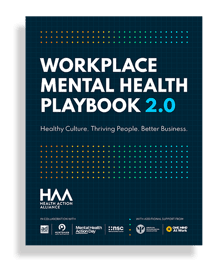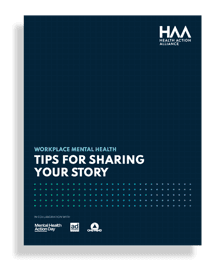If you’re in HR, you're front and center for every crisis, celebration, and company-wide change — navigating the planning, the emotions, and the aftermath. But here's the question: Who's checking in on you?
The emotional burden of managing people operations is taking a toll. Many HR professionals have reported high rates of burnout and have considered leaving the field altogether. While you’re helping others, it can feel hard to take time for yourself.
Human resources leaders are often tasked with managing the mental health of the entire organization — a responsibility that can add to their own emotional strain. Among HR professionals:

When you take care of yourself, you're able to bring your best to work. And when you show up for your own mental health, you give your team permission to do the same. Small actions can help create a culture of well-being.
Share what’s helping you, whether that's stepping away for a walk, saying no to non-urgent tasks, accessing company wellness benefits, using mental health days, or seeking support from a health care provider.
Normalize healthy boundaries by blocking lunch time on your calendar and stepping away from email and messaging apps after hours. Respect your team members' time by not expecting immediate responses during off-hours.
Take your own breaks visibly and use your paid time off without guilt. Remind your team that breaks are not only OK, they’re necessary. Rest supports focus, energy, and long-term performance.
Talk to your own manager if you’re feeling stretched. You don’t have to carry everything alone; get support from your mental health provider, connect with trusted coworkers, or seek out peer support networks for HR leaders. Finding spaces where you can talk openly and share experiences can make a big difference.

Whether you’re looking for general mental health tips, resources on creating a recovery-ready workplace, or finding ways to share your mental health story, there’s a chance we’ve put out a free resource to help create better mental health policies in your workplace today.
Here’s a selection of some of our most popular mental health resources:

Wherever your company is on its mental health journey, this playbook can help you take action. Explore ways to:

You can set a tone of compassion and care for employees experiencing mental health challenges. Over 75% of employees appreciate their leaders discussing emotional and mental health. If you’re ready to share — and it’s OK if you aren't — follow the tips inside.

In our increasingly divided society, many people today feel disconnected — from their communities, their coworkers, and even themselves. This sense of isolation can lead to more stress, lower engagement, and missed work.
But the workplace can be part of the solution. Employers have a powerful opportunity to build a culture of belonging where every employee feels valued, respected, and connected. This guide can help you take the first step.
Sign up for our newsletter to keep updated on HAA’s latest initiatives, insights and recommendations, and be first to receive new resources and event invitations.
Sign up